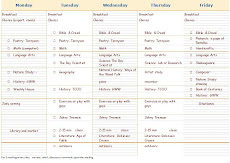Today I told him to tell me back the story (A Bundle of STicks from Aesop's Fables) and that I would write it down for him. He talked to me too fast for me to write it down exactly but this is what I got down:
The father gave the sons a bundle of sticks, and they tried to break it, but they couldn't.Cute, huh? I really didn't want to mess up narration for this young one. I want to be able to rely on it as a learning tool, since I am commited to literature as a force for education but want to do everything I can to foster attentiveness in dealing with it. I always have had trouble with narration before. IT didn't seem natural to ME. But trying to narrate the books I read to myself (I've actually been trying to narrate Kieron's Year 4 material) made me both more respectful of the way it helps retention AND the difficulty of it. So from that base I have been able to persevere better in asking for narration. Kieron doesn't really like to do it but he is seeing the point in it and does well.
Then he gave the sticks to them one by one and they broke them easily.
He said, "My sons, if you agree with each other, the enemy won't be able to injure you --
if you're bad and don't agree with each other, then you won't be any stronger than those sticks."
When I asked about starting narration on the Ambleside list with my six year old, several people suggested that we start off slowly with Aesop's Fables and other simple tales, and then build from there.
Aidan's narrations right now are still about events of daily life. I've been working with him on accurate observation. But when he's more ready to listen to stories I think the narration process will help him, too.



